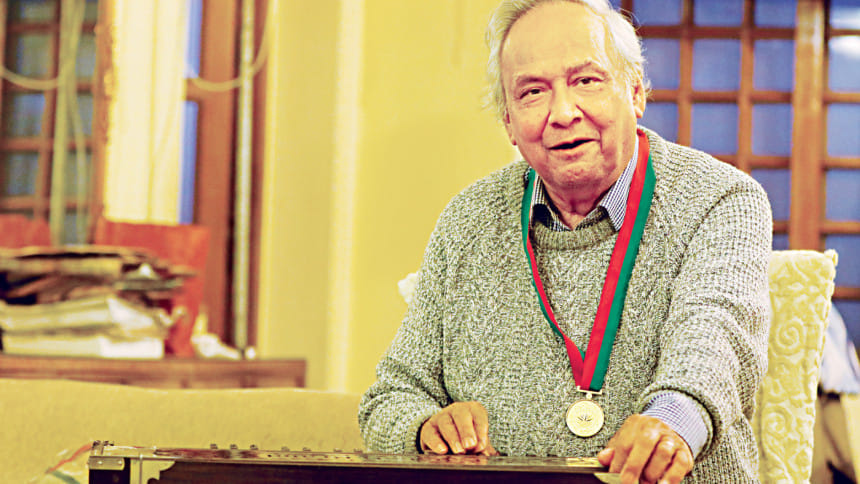Fighting a war with melody

It was the dreadful night in March 25, 1971 that urged a 28-year-old Mahmudur Rahman Benu, a professor of statistics at Institute of Statistical Research & Training (ISRT) and a music teacher at Chhayanaut, to pick up the rifle against the Pakistani army, for the survival of our nation and ideals. Driven by drilling gunshots and chilling uncertainty, 'Benu bhai', as he was lovingly known, set off on his journey to join the Mukti Bahini.
"I heard that Major Khaled Mosharraf and others were forming a band to combat a scary battalion, perfectly trained in warfare," shares Mahmudur Rahman Benu. Following their trails from Narsindgi to Brahmanbaria, to Shingarbil, he finally found them in training camps set in the Wests in Betai, Petrapole, and other neighbouring regions.
He signed up for training for a camp in Betai on April 14 under then Captain Hafiz. "My choice was not driven by romanticism, rather it was purely determined by the urge to survive in a battlefield against a terror that left no choice for us but to learn to fight," shared the emotional musician.
He soon had to leave his camp as his nephew, Mohammad Kazi Iqbal, was captured by the Pakistani army, while fighting in the war. "I had promised my brother to take care of him, so I had to inform him that he might never see his son again," he said. "Thankfully, even though he had to go through brutal torture, he somehow survived the ordeal."
Benu left for home, and could not return camp. However, he was determined to contribute to the cause in the best way he could, with his mellifluous voice. "Rather than shooting and dodging bullets in the battlefield, which I would have been horrible at, I then chose to aid the mental wellbeing of my people with music, the love of my life," he adds.
Travelling through army and refugee camps, Mahmudur Rahman Benu and his Mukti Shangrami Shilpi Sangstha marched with their flutes, tabla, harmonium, and other local instruments, providing much needed motivation for his brethren to march forward.
"We would sing patriotic songs to the fighters, boosting their confidence, while opting for traditional folk, Nazrul sangeet, and Tagore's songs for the common people, who had to leave behind their homes just to live another day," he mentions.
"Once, we had to sing in a camp at Kolakupa, where thousands of people were stuck in a flooded area for 3 days. They could not even sit down to rest. Upon arrival, we were unsure if they wanted to listen to music while in such inhumane conditions," he shares.
"The people of the camp walked up to us, and said that they have been waiting for us since the morning, as they believed that our music could ease their pain," he recalls from his visits to over 250 such camps during the war. "We had to sing at least 60-70 songs every day, and by the time we finished, our voices would be hoarse. Still, within a couple of hours of rest, we would set on our paths again."
After the war, Mahmudur Rahman Benu flew to Leeds for a PhD, later travelling to Sheffield, where he taught Bangla and statistics at a school. "Chhayanaut had introduced me to my culture, and also taught me to love it. I wanted to disperse this feeling to others around me. Thus, I opened my music school by the same name (Chhayanaut), where I taught different types of South Asian classical and folk music," says Benu, who later moved to London, where he currently resides.
Mahmudur Rahman Benu has been honoured with the prestigious Ekushey Padak for his contribution to the Liberation War, and for his attempts to globally raise awareness about it.
"This is a great honour, but when I imagine myself in the same picture as the ones who have sacrificed so much, I find myself to be miniscule. Today, I can sing in Bangla, only because they chose to stand in front of the bullets 50 years ago," concludes the ever-smiling Benu bhai.

 For all latest news, follow The Daily Star's Google News channel.
For all latest news, follow The Daily Star's Google News channel. 



Comments